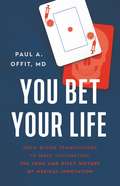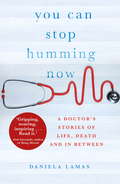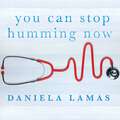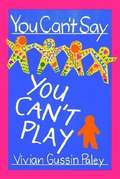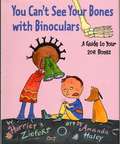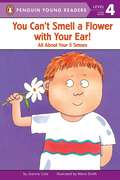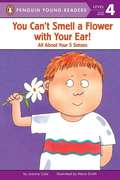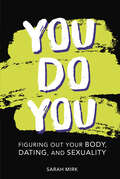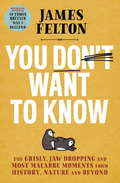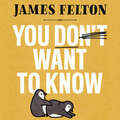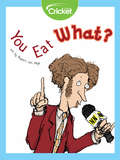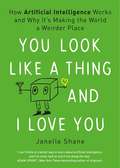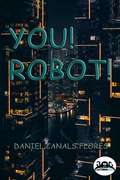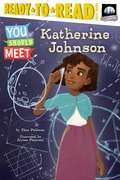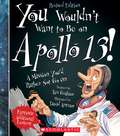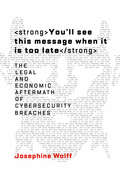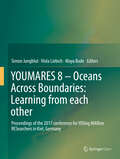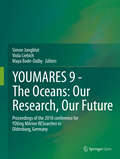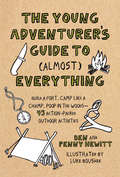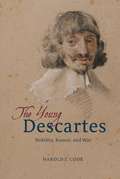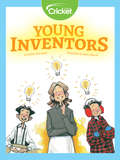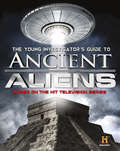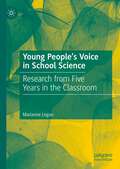- Table View
- List View
You Bet Your Life: From Blood Transfusions to Mass Vaccination, the Long and Risky History of Medical Innovation
by Paul A OffitOne of America&’s top physicians traces the history of risk in medicine—with powerful lessons for today Every medical decision—whether to have chemotherapy, an X-ray, or surgery—is a risk, no matter which way you choose. In You Bet Your Life, physician Paul A. Offit argues that, from the first blood transfusions four hundred years ago to the hunt for a COVID-19 vaccine, risk has been essential to the discovery of new treatments. More importantly, understanding the risks is crucial to whether, as a society or as individuals, we accept them. Told in Offit&’s vigorous and rigorous style, You Bet Your Life is an entertaining history of medicine. But it also lays bare the tortured relationships between intellectual breakthroughs, political realities, and human foibles. Our pandemic year has shown us, with its debates over lockdowns, masks, and vaccines, how easy it is to get everything wrong. You Bet Your Life is an essential read for getting the future a bit more right.
You Can Stop Humming Now: A Doctor's Stories of Life, Death and in Between
by Dr. Daniela Lamas'Gripping, soaring, inspiring . . . Read it' - Atul Gawande, author of the international bestseller Being Mortal'You Can Stop Humming Now is essential reading on what it means to be human in an age of medical technology. I couldn't put it down' - Alexandria Marzano-Lesnevich, author of The Fact of a Body'In turns anguishing, gripping, and hopeful, You Can Stop Humming Now is a must-read for anyone contemplating what medicine holds in store for us.' - Danielle Ofri, MD, PhD, author of What Patients Say, What Doctors FeelModern medicine is a world that glimmers with new technology and cutting-edge research. To the public eye, medical stories often begin with sirens and flashing lights and culminate in survival or death. But these are only the most visible narratives. As a critical care doctor treating people at their sickest, Daniela Lamas is fascinated by a different story: what comes after for those whose lives are extended by days, months, or years as a result of our treatments and technologies?In You Can Stop Humming Now, Lamas explores the complex answers to this question through intimate accounts of patients and their families. A grandfather whose failing heart has been replaced by a battery-operated pump; a salesman who found himself a kidney donor on social media; a college student who survived a near fatal overdose and returned home, alive but not the same; and a young woman navigating an adulthood she never thought she'd live to see-these moving narratives paint a detailed picture of the fragile border between sickness and health.Riveting, beautifully told, and deeply personal, You Can Stop Humming Now is a compassionate, uncompromising look at the choices and realities that many of us, and our families, may one day face.
You Can Stop Humming Now: A Doctor's Stories of Life, Death and in Between
by Dr. Daniela Lamas'Gripping, soaring, inspiring . . . Read it' - Atul Gawande, author of the international bestseller Being Mortal'You Can Stop Humming Now is essential reading on what it means to be human in an age of medical technology. I couldn't put it down' - Alexandria Marzano-Lesnevich, author of The Fact of a Body'In turns anguishing, gripping, and hopeful, You Can Stop Humming Now is a must-read for anyone contemplating what medicine holds in store for us.' - Danielle Ofri, MD, PhD, author of What Patients Say, What Doctors FeelModern medicine is a world that glimmers with new technology and cutting-edge research. To the public eye, medical stories often begin with sirens and flashing lights and culminate in survival or death. But these are only the most visible narratives. As a critical care doctor treating people at their sickest, Daniela Lamas is fascinated by a different story: what comes after for those whose lives are extended by days, months, or years as a result of our treatments and technologies?In You Can Stop Humming Now, Lamas explores the complex answers to this question through intimate accounts of patients and their families. A grandfather whose failing heart has been replaced by a battery-operated pump; a salesman who found himself a kidney donor on social media; a college student who survived a near fatal overdose and returned home, alive but not the same; and a young woman navigating an adulthood she never thought she'd live to see-these moving narratives paint a detailed picture of the fragile border between sickness and health.Riveting, beautifully told, and deeply personal, You Can Stop Humming Now is a compassionate, uncompromising look at the choices and realities that many of us, and our families, may one day face.
You Can't Say You Can't Play
by Vivian Gussin PaleyWho of us cannot remember the pain and humiliation of being rejected by our classmates? However thick-skinned or immune to such assaults we may become as adults, the memory of those early exclusions is as palpable to each of us today as it is common to human experience. We remember the uncertainty of separating from our home and entering school as strangers and, more than the relief of making friends, we recall the cruel moments of our own isolation as well as those children we knew were destined to remain strangers.<P> In this book Vivian Paley employs a unique strategy to probe the moral dimensions of the classroom. She departs from her previous work by extending her analysis to children through the fifth grade, all the while weaving remarkable fairy tale into her narrative description. Paley introduces a new rule-"You can't say you can't play"-to her kindergarten classroom and solicits the opinions of older children regarding the fairness of such a rule. We hear from those who are rejected as well as those who do the rejecting. One child, objecting to the rule, says, "It will be fairer, but how are we going to have any fun?" Another child defends the principle of classroom bosses as a more benign way of excluding the unwanted.<P> In a brilliant twist, Faley mixes fantasy and reality, and introduces a new voice into the debate: Magpie, a magical bird, who brings lonely people to a place where a full share of the sun is rightfully theirs. Myth and morality begin to proclaim the same message and the schoolhouse will be the crucible in which the new order is tried. A struggle ensues and even the Magpie stories cannot avoid the scrutiny of this merciless pack of social philosophers who will not be easily caught in a morality tale.<P> You Can't Say You Can't Play speaks to some of our most deeply held beliefs. Is exclusivity part of human nature? Can we legislate fairness and still nurture creativity and individuality? Can children be freed from the habit of rejection? These are some of the questions. The answers are to be found in the words of Paley's schoolchildren and in the wisdom of their teacher who respectfully listens to them.
You Can't See Your Bones With Binoculars: A Guide To Your 206 Bones
by Harriet ZiefertText and illustrations, including x-rays, provide a guided tour of the human skeleton, encouraging the reader to find and feel each bone as it is described.
You Can't Smell a Flower with Your Ear! (Penguin Young Readers, Level 4)
by Joanna ColeLevel Four How can your tongue tell a sweet taste from a sour one? How do your ears know which way a sound is coming from? Find out in this sense-sational nonfiction book!
You Can't Smell a Flower with Your Ear! All About Your 5 Senses
by Joanna ColeHow can your tongue tell a sweet taste from a sour one? How do your ears know which way a sound is coming from? Find out in this sense-sational nonfiction book!
You Do You: Figuring Out Your Body, Dating, and Sexuality
by Sarah MirkTeen sex. STIs. Sexting. Rape. Sexual harassment. #MeToo and #YesAllWomen. Today's teens launch into their sexual lives facing challenging issues but with little if any formalized learning about sex and human reproduction. Many of them get their sex ed from online porn. Through this authoritative, inclusive, and teen-friendly overview, readers learn the basics about sex, sexuality, human reproduction and development, birth control, gender identity, healthy communication, dating, relationships and break ups, the importance of consent, safety, body positivity and healthy lifestyles, media myths, and more. Advice-column-style Q&As and real-life stories add human drama and authenticity.
You Don't Want to Know: The grisly, jaw-dropping and most macabre moments from history, nature and beyond
by James FeltonWith his trademark brand of bulldozer-banter, Twitter legend James Felton guides you through the most morbidly fascinating facts you'll then wish you could forget. Ever wondered why the chainsaw was invented?* How authorities dealt with a beached whale back in ye olde days of 1970?** Or what being a human decanter entails?*** Then you've come to the right place! Within these pages you'll find the maddest, strangest and downright grossest stories from history, nature and science that you don't want to know. (Except secretly you really do you masochistic, beastly person you.) Illustrated, painfully funny and drop-your-jaw ridiculous, this is trivia from the cesspit of time that you won't be able to stop reading once you start.*To aid childbirth.**They exploded it with 100 times too much dynamite and rained blubber down on unsuspecting people and buildings.***Decency prevents us from answering this one here. You'll have to buy the book to find out.
You Don't Want to Know: The grisly, jaw-dropping and most macabre moments from history, nature and beyond
by James FeltonWith his trademark brand of bulldozer-banter, Twitter legend James Felton guides you through the most morbidly fascinating facts you'll then wish you could forget. Ever wondered why the chainsaw was invented?* How authorities dealt with a beached whale back in ye olde days of 1970?** Or what being a human decanter entails?*** Then you've come to the right place! Within these pages you'll find the maddest, strangest and downright grossest stories from history, nature and science that you don't want to know. (Except secretly you really do you masochistic, beastly person you.) Illustrated, painfully funny and drop-your-jaw ridiculous, this is trivia from the cesspit of time that you won't be able to stop reading once you start.*To aid childbirth.**They exploded it with 100 times too much dynamite and rained blubber down on unsuspecting people and buildings.***Decency prevents us from answering this one here. You'll have to buy the book to find out.
You Don't Want to Know: The grisly, jaw-dropping and most macabre moments from history, nature and beyond
by James FeltonRead by James Buckley aka unforgettable Jay from The Inbetweeners' With his trademark brand of bulldozer-banter, Twitter legend James Felton guides you through the most morbidly fascinating facts you'll then wish you could forget. Ever wondered why the chainsaw was invented?* How authorities dealt with a beached whale back in ye olde days of 1970?** Or what being a human decanter entails?*** Then you've come to the right place! Within these pages you'll find the maddest, strangest and downright grossest stories from history, nature and science that you don't want to know. (Except secretly you really do you masochistic, beastly person you.) Illustrated, painfully funny and drop-your-jaw ridiculous, this is trivia from the cesspit of time that you won't be able to stop reading once you start.*To aid childbirth.**They exploded it with 100 times too much dynamite and rained blubber down on unsuspecting people and buildings.***Decency prevents us from answering this one here. You'll have to buy the book to find out.
You Eat What?
by Liz HuyckSome animals have pretty weird tastes in dining. Did you know that porcupines eat antlers, chickens eat rocks, and elephants eat clay? Hold onto your menus, we're going in!
You Look Like a Thing and I Love You: How Artificial Intelligence Works And Why It's Making The World A Weirder Place
by Janelle Shane'I can't think of a better way to learn about artificial intelligence, and I've never had so much fun along the way' Adam Grant, New York Times bestselling author of Originals and Option B AI is the technology of the future, but how does it actually work? A hilarious, transporting look under the hood of the technology that's changing the world - and why it's dumber than we thinkYou Look Like a Thing and I Love You is one of the best pickup lines ever . . . according to an artificial intelligence trained by scientist Janelle Shane, creator of the popular blog AI Weirdness. She makes silly AIs that learn how to name paint colors, create the best recipes, and even flirt (badly) with humans - all to understand the technology that governs so much of our human lives. We rely on AI every day for recommendations, for rust AI with matters of life and death, on the road and in our hospitals. But how smart is AI really . . . and how does it solve problems, understand humans, and drive self-driving cars?This hilarious introduction to the most interesting science of our time, shows us how these programs learn, fail, and adapt - and how they reflect both the best and the worst of humanity.
You Need Your Nose: Learning the N Sound (PowerPhonics)
by Kevin SarkisianThis book teaches facts while incorporating the fundamentals of phonemic patterns and usage
You! Robot!
by Daniel Canals FloresA Dystopic Description of the future of Humankind based on man's lack of interest in addressing climate change coupled with the obsessive desire for comfort and profit over other values. Mankind could fall into the trap of allowing machines to cater to his every need.
You should Meet: Katherine Johnson
by Thea FeldmanMeet Katherine Johnson, a brilliant mathematician who worked at NASA in the early 1950s until retiring in 1986. Katherine's unparalleled calculations (done by hand) helped plan the trajectories for NASA's Mercury and Apollo missions (including the Apollo 11 moon landing). She is said to be one of the greatest American minds of all time.
You Wouldn't Want to Be on Apollo 13!: A Mission You'd Rather Not Go On (You Wouldn't Want To... Series)
by Ian GrahamCount down to liftoff! You are about to go on the most exciting and dangerous journey of your life. You are part of the crew on the spacecraft Apollo 13. It's Amazing! Top Tips from Experts! If you need to meets, do it before your helmet is fitted! Make sure you ate tightly strapped into your seal for takeoff. Don't panic! Keep calm or you might make things worse. Don't move around too much-you'll use up more precious oxygen.
You'll See This Message When It Is Too Late: The Legal and Economic Aftermath of Cybersecurity Breaches (Information Policy)
by Josephine WolffWhat we can learn from the aftermath of cybersecurity breaches and how we can do a better job protecting online data. Cybersecurity incidents make the news with startling regularity. Each breach—the theft of 145.5 million Americans' information from Equifax, for example, or the Russian government's theft of National Security Agency documents, or the Sony Pictures data dump—makes headlines, inspires panic, instigates lawsuits, and is then forgotten. The cycle of alarm and amnesia continues with the next attack, and the one after that. In this book, cybersecurity expert Josephine Wolff argues that we shouldn't forget about these incidents, we should investigate their trajectory, from technology flaws to reparations for harm done to their impact on future security measures. We can learn valuable lessons in the aftermath of cybersecurity breaches. Wolff describes a series of significant cybersecurity incidents between 2005 and 2015, mapping the entire life cycle of each breach in order to identify opportunities for defensive intervention. She outlines three types of motives underlying these attacks—financial gain, espionage, and public humiliation of the victims—that have remained consistent through a decade of cyberattacks, offers examples of each, and analyzes the emergence of different attack patterns. The enormous TJX breach in 2006, for instance, set the pattern for a series of payment card fraud incidents that led to identity fraud and extortion; the Chinese army conducted cyberespionage campaigns directed at U.S.-based companies from 2006 to 2014, sparking debate about the distinction between economic and political espionage; and the 2014 breach of the Ashley Madison website was aimed at reputations rather than bank accounts.
YOUMARES 8 – Oceans Across Boundaries: Proceedings Of The 2017 Conference For Young Marine Researchers In Kiel, Germany
by Maya Bode Viola Liebich Simon JungblutThis open access book presents the proceedings volume of the YOUMARES 8 conference, which took place in Kiel, Germany, in September 2017, supported by the German Association for Marine Sciences (DGM). The YOUMARES conference series is entirely bottom-up organized by and for YOUng MARine RESearchers. Qualified early career scientists moderated the scientific sessions during the conference and provided literature reviews on aspects of their research field. These reviews and the presenters’ conference abstracts are compiled here. Thus, this book discusses highly topical fields of marine research and aims to act as a source of knowledge and inspiration for further reading and research.
YOUMARES 9 - The Oceans: Proceedings of the 2018 conference for YOUng MArine RESearcher in Oldenburg, Germany
by Simon Jungblut Viola Liebich Maya Bode-DalbyThis open access book summarizes peer-reviewed articles and the abstracts of oral and poster presentations given during the YOUMARES 9 conference which took place in Oldenburg, Germany, in September 2018. The aims of this book are to summarize state-of-the-art knowledge in marine sciences and to inspire scientists of all career stages in the development of further research. These conferences are organized by and for young marine researchers. Qualified early-career researchers, who moderated topical sessions during the conference, contributed literature reviews on specific topics within their research field.
The Young Adventurer's Guide to (Almost) Everything: Build a Fort, Camp Like a Champ, Poop in the Woods-45 Action-Packed Outdoor Activities
by Ben Hewitt45 step-by-step, illustrated activties that teach kids everything from how to see like an owl to build the world's coolest fort from sticks. (ages 8-12)Calling all adventurers! Want to know how to build a fort from nothing but sticks? Or find your way through the forest? This survival guide is your ticket to getting down and dirty in nature and learning to make the coolest things with your own two hands. Look inside to learn how to: • Use a knife without bleeding • Sleep in the woods without freezing • Escape a bear without getting eaten • Poop in the woods without falling down • Find your way home without a GPS • Eat bugs without throwing up • And so much more!
The Young Descartes: Nobility, Rumor, and War
by Harold J. CookRené Descartes is best known as the man who coined the phrase “I think, therefore I am.” But though he is remembered most as a thinker, Descartes, the man, was no disembodied mind, theorizing at great remove from the worldly affairs and concerns of his time. Far from it. As a young nobleman, Descartes was a soldier and courtier who took part in some of the greatest events of his generation—a man who would not seem out of place in the pages of The Three Musketeers. In The Young Descartes, Harold J. Cook tells the story of a man who did not set out to become an author or philosopher—Descartes began publishing only after the age of forty. Rather, for years he traveled throughout Europe in diplomacy and at war. He was present at the opening events of the Thirty Years' War in Central Europe and Northern Italy, and was also later involved in struggles within France. Enduring exile, scandals, and courtly intrigue, on his journeys Descartes associated with many of the most innovative free thinkers and poets of his day, as well as great noblemen, noblewomen, and charismatic religious reformers. In his personal life, he expressed love for men as well as women and was accused of libertinism by his adversaries. These early years on the move, in touch with powerful people and great events, and his experiences with military engineering and philosophical materialism all shaped the thinker and philosopher Descartes became in exile, where he would begin to write and publish, with purpose. But though it is these writings that made ultimately made him famous, The Young Descartes shows that this story of his early life and the tumultuous times that molded him is sure to spark a reappraisal of his philosophy and legacy.
Young Inventors
by Kathie MacIsaacKids have always had amazing ideas, like how to keep your ears warm on a cold winter day or an icy treat to enjoy on a hot summer day. Learn about four young inventors and their inventions that helped to change people's lives.
The Young Investigator's Guide to Ancient Aliens
by History ChannelAs a tie-in to the wildly successful History Channel show, here's a book filled with fascinating tales, ancient folklore, and compelling evidence of the role extraterrestrials may have played in human history. What really happened to the dinosaurs? Who actually built the ancient pyramids in Egypt? Are airplanes really as modern as we think they are? This book takes a close look at landmark events throughout history and asks the question: What if aliens were involved? Spanning history, from the earliest of human civilizations to the modern period, this book exposes evidence of the presence of extraterrestrials in some of our most triumphant and devastating moments.
Young People’s Voice in School Science: Research from Five Years in the Classroom
by Marianne LoganThis book highlights young people’s changing attitudes toward and interest in science over the course of a five-year longitudinal study. Utilizing a mixed-methods approach, the author presents rich data from children and young people, as well as their parents and teachers. By providing a glimpse of science pedagogy from the perspective of young people and those who work with them, the book identifies factors that affect students' interest in science throughout their primary and secondary education. The book also examines a posthumanist philosophical approach to science education and emphasizes the interrelationship of all things within the context of science education.
